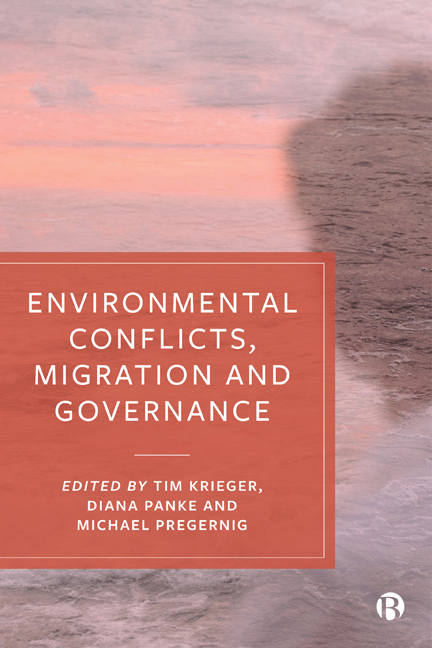Book contents
- Frontmatter
- Contents
- List of Figures and Tables
- List of Acronyms
- Notes on Contributors
- Acknowledgements
- 1 Environmental and Resource-Related Conflicts, Migration and Governance
- 2 Renewable Resource Scarcity, Conflicts and Migration
- 3 Extractive Resources, Conflicts and Migration
- 4 Climate Change, Conflicts and Migration
- 5 The Individual Level: Selection Effects
- 6 The Individual Level: Sorting Effects
- 7 Migration Governance at the State Level: Policy Developments and Effects
- 8 Environmental Migration Governance at the Regional Level
- 9 Migration Governance at the Global Level: Intergovernmental Organizations and Environmental Change-Induced Migration
- 10 The Link between Forced Migration and Conflict
- 11 Conflict-Prone Minerals, Forced Migration and Norm Dynamics in the Kimberley Process and ICGLR
- 12 On the Nexus Between Environmental Conflict, Migration and Governance: Concluding Remarks
- Index
6 - The Individual Level: Sorting Effects
- Frontmatter
- Contents
- List of Figures and Tables
- List of Acronyms
- Notes on Contributors
- Acknowledgements
- 1 Environmental and Resource-Related Conflicts, Migration and Governance
- 2 Renewable Resource Scarcity, Conflicts and Migration
- 3 Extractive Resources, Conflicts and Migration
- 4 Climate Change, Conflicts and Migration
- 5 The Individual Level: Selection Effects
- 6 The Individual Level: Sorting Effects
- 7 Migration Governance at the State Level: Policy Developments and Effects
- 8 Environmental Migration Governance at the Regional Level
- 9 Migration Governance at the Global Level: Intergovernmental Organizations and Environmental Change-Induced Migration
- 10 The Link between Forced Migration and Conflict
- 11 Conflict-Prone Minerals, Forced Migration and Norm Dynamics in the Kimberley Process and ICGLR
- 12 On the Nexus Between Environmental Conflict, Migration and Governance: Concluding Remarks
- Index
Summary
Introduction
Environmental, resource and climate conflicts have been named as important individual-level triggers of migration. People leave their home countries when soil degradation, extreme weather conditions, natural disasters, and the existence of valuable mineral resources result in domestic conflicts. These conflicts may stem from, for example, general resource scarcity, ethnic groups fighting over scarce resources such as fresh water, or rebel groups trying to get hold of valuable minerals to fund their activities, all of which often harm the population (see Chapters 2 and 3).
In the face of such conflicts, individuals – or specific groups of individuals – may decide to leave their home countries and move elsewhere. Where exactly migrants head to is an open question, given that there are dozens of potential destinations. What drives the decision of an individual to choose a particular destination, move, and settle there? How do individual decisions aggregate to migration flows into a destination? The concept of ‘migrant sorting’ provides insights into these questions.
The sorting of migrants is the last step of the larger process of migration. In the first step, in response to environmental conflict, a sub-set of potential migrants becomes actual migrants by deciding to leave their home countries (see Chapter 5). Often, these migrants are not a random draw from the source-country population, but some part of the population that finds migration more important than other parts of the population. For example, migrants might come from an ethnic minority that is forcefully blocked from using a scarce resource by the majority. Finally, this specific group of migrants, or parts of this group, not only decide to sort into a specific destination, but are also allowed to enter it. That is, migration governance does not prevent them from doing so. This is not always the case. For instance, migrants who flee because of slowly changing climate conditions may simply be considered economic migrants according to national immigration legislation and not be allowed in (see Chapter 7).
- Type
- Chapter
- Information
- Environmental Conflicts, Migration and Governance , pp. 103 - 120Publisher: Bristol University PressPrint publication year: 2020



